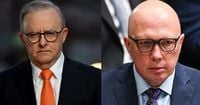As Australia approaches the federal election on May 3, 2025, recent polling indicates a significant lead for the Labor Party, suggesting a potential historic electoral outcome for the Coalition. A YouGov MRP poll conducted from April 1 to 29, 2025, reveals that Labor is poised to win 84 of the 150 seats in the House of Representatives, marking an 18-seat majority. This forecast is bolstered by a 53–47% lead over the Coalition in both Redbridge and Spectre Strategy polls, indicating a troubling trend for the opposition.
The YouGov poll, which sampled 35,185 individuals, shows a notable shift since the last polling period, with Labor gaining nine seats while the Coalition has lost 13. The Greens are projected to secure three seats, independents 14, and others two. This data suggests that unless the Coalition experiences a dramatic surge in the final days before the election, Labor is likely to secure a decisive victory.
In the latest Redbridge poll, conducted from April 24 to 29, 2025, Labor maintained a 53–47% advantage, reflecting a one-point gain since early April. The poll, which included a sample of 1,011 people, indicated primary votes of 34% for both Labor and the Coalition, alongside 12% for the Greens and 8% for One Nation. Interestingly, 24% of respondents expressed a preference for a majority Labor government, while 30% favored a majority Coalition government.
The new pollster Spectre Strategy, which surveyed 2,000 individuals from April 24 to 28, also echoed these findings. It reported a similar 53–47% lead for Labor, with primary votes at 34% for the Coalition and 31% for Labor. Notably, the poll highlighted strong support for Labor among women voters (71%) and younger men aged 18 to 34 (64%), although older voters (aged 55 and over) leaned towards the Coalition, favoring them by 58–42%.
The political landscape appears increasingly grim for Opposition Leader Peter Dutton, who, while campaigning in his home electorate of Dickson, faces challenges from both Labor and a teal independent challenger. Dutton's seat, historically significant as the most marginal in Queensland, has been held by the Liberals for 24 years. Despite these pressures, he insists that his presence in the electorate is routine and not a sign of concern. "I’m here for the annual Red Shield Appeal breakfast, not because I’m worried," he stated.
However, Dutton's leadership has been marred by policy inconsistencies, including a recent retreat from proposed changes to school curriculums. This backtracking has drawn criticism from Prime Minister Anthony Albanese, who remarked, "The current school curriculum was put in place by the former coalition government, not us, but they looked for culture wars in every corner that they can find one." Albanese's comments reflect a broader narrative of the Coalition's struggle to maintain a coherent policy front amidst growing electoral pressure.
Polling indicates that Labor's primary vote has increased to 31.4%, while the Coalition's has decreased to 31.1%. In the context of the 2022 election flows, Labor would lead the Coalition by 54.1% to 45.9%. This shift in voter sentiment is particularly concerning for the Coalition, as the combined major party vote has dipped to 62.5%, down from 68.3% in the previous election, signaling a potential realignment in voter preferences.
As the election date draws nearer, early voting has seen approximately one-in-four eligible Australians participating, indicating a heightened level of engagement among the electorate. This level of participation could further influence the final outcome, as trends suggest a more significant turnout may favor Labor.
In addition to the electoral dynamics, economic factors are also at play. The Australian Bureau of Statistics recently released its March quarter inflation report, revealing a 0.9% increase in headline inflation, the highest quarterly rise since June 2024. Core inflation has also seen an uptick, which could impact voter sentiment as economic concerns often weigh heavily on election outcomes.
Amidst these developments, Treasurer Jim Chalmers has accused Dutton of “selling out Australia” with American-style healthcare policies. His comments reflect a broader critique of the Coalition's approach to governance, as Labor seeks to position itself as the party of stability and progressive policy.
As the campaign unfolds, the Coalition's strategy appears increasingly reactive, with Dutton’s team facing scrutiny over inconsistencies in messaging and policy proposals. The final days leading up to the election will be crucial as both parties vie for voter support in a rapidly changing political landscape.
With Labor's polling strength and the Coalition's vulnerabilities, the upcoming election could reshape the Australian political landscape for years to come. As voters prepare to cast their ballots, the stakes have never been higher, and the outcome remains uncertain.




